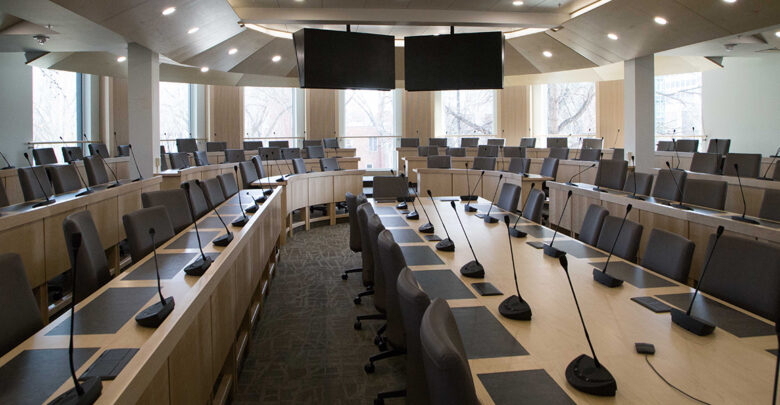Students’ Council motion sparks controversy over aboriginal student representation
 Joshua Storie
Joshua StorieA motion in Students’ Council has incited debate concerning representation in student governance that some say could lead to the silencing of marginalized groups.
Currently, only councillors — and no students-at-large — can vote in Students’ Council’s standing committees. But a motion being tabled in Council’s upcoming meeting on Tuesday could allow for students-at-large to have voting power in standing committees. Native Studies councillor Nathan Sunday is pushing for the motion because he wants Aboriginal students to be able to vote on the Aboriginal Relations and Reconciliation standing committee if it’s formed, which he said was promised to them.
However, Brandon Christensen, the medicine and dentistry councillor and chair of Council’s bylaw committee, said it was only recommended in the March 14 meeting that Students’ Council discuss the legality of allowing students-at-large to vote on standing committees and that no promises were made.
While the debate around this motion has become quite technical, if it passes (and holds) it could have large implications. Sunday said having the motion fail would mean other marginalized groups, such as international students, couldn’t have a say in decisions that affect them in council committees in the future.
Heather Lindsay, vice-president (administration) of the Native Studies Students’ Association and member of the Aboriginal Relations and Reconciliation ad hoc committee, said representation by population is not always the best way to represent marginalized communities. She said she believes this motion is not in good faith.
“If you just be honest with yourself and other people and just say, ‘Yes I’m racist, I don’t like you taking away my privilege,’ then we can actually deal with the problem,” she said.
Christensen said that when he first joined Council he was strongly in favour of allowing students-at-large to vote on standing committees. Now, he feels having a representative democracy is important because unelected students can’t be held accountable and there’s no way to tell if they are really representing the common interests of their constituents. However, he thinks compromises could be made.
“There have been efforts made to bridge the gap and to come up with compromises that would help ensure that the committee wasn’t stifled in anyway,” he said. “Unfortunately, councillor Sunday has been opposed to any outreach for compromise.”
Howie said she “absolutely believes” Aboriginal students should be voting on these issues, but she doesn’t think a standing committee is necessarily the best choice. She said there are a lot of rules around standing committees, but that a task force or advisory group could be more effective.
“This is about having those voices heard, making sure promises are being kept, making sure that Aboriginal students are being considered, and that we’re doing our due diligence to consult with them,” she said. “I personally think that that’s an incredibly important thing to do.”
Sunday said the Aboriginal Relations and Reconciliation committee should be a standing committee because, unlike other types of committees, they are permanent parts of council and are written into bylaw. He said motions like this will show what role the Students’ Union actually wants to play an active role in reconciliation.
“It’s not the 1940’s anymore. You can’t have non-aboriginal people representing Aboriginal people and their voices,” he said. “Right there that’s systemic racism.”
Students’ Council will be meeting in Council Chambers (University Hall 2-100) at 6 p.m. on August 22 to discuss the motion. All students are permitted to ask questions to the council during its Open Forum period.




